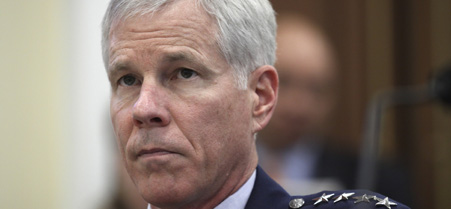Air Force cyber chief: Speed up acquisitions already
The service also must improve cyber situational awareness and resilient networks.
 Gen. William Shelton, commander of the Air Force Space Command, said that dependence on networks has made them an attractive target for attackers.
Gen. William Shelton, commander of the Air Force Space Command, said that dependence on networks has made them an attractive target for attackers.
COLORADO SPRINGS, Colo. -- Gen. William Shelton, commander of the Air Force Space Command, engaged Tuesday in what he called a "soapbox rant" to decry the military's Industrial Age approach to acquiring cyber capabilities. He was speaking at a symposium sponsored by the Rocky Mountain chapter of the Armed Forces Communications and Electronics Association, an industry group.
Shelton, who oversees Air Force space and cyberspace operations, said the Defense Department acquires cyber capabilities the same way it buys aircraft or satellites -- a process that can take years, while new developments in computer hardware and software can happen in days or months. "I am frustrated by the lack of speed," in cyber acquisitions, Shelton told an audience of more than 1,000 people at the symposium.
The current cyber acquisition system threatens the military's cyber mission. He said the Electronic Systems Center at Hanscom Air Force Base, Mass., which manages acquisition of information technology and cyber systems for the service, has started to develop capabilities to fill technology gaps "within hours or weeks," but he did not provide any details.
The Air Force also must develop better situational awareness of potential threats in cyberspace because "we can't defend [against] what we can't see," Shelton said, and dependence on networks has made them an attractive target for attackers.
Protecting those networks means the Air Force needs to move from a purely defensive posture to develop more resilient networks that can automatically reroute traffic when they come under attack, he added.
The Air Force requires technically trained personnel to handle its cyber mission and Shelton said the continuing lack of science, technology, engineering and math students who are U.S. citizens has created a "national security issue." He proposed various incentives, including changes to the G.I. Bill, to boost the number of graduates in those critical fields.
Incentives may not help the Air Force meet its requirements, as Nextgov reported Monday that only 3 percent of science, technology, engineering and math students plan to work for the federal government.






